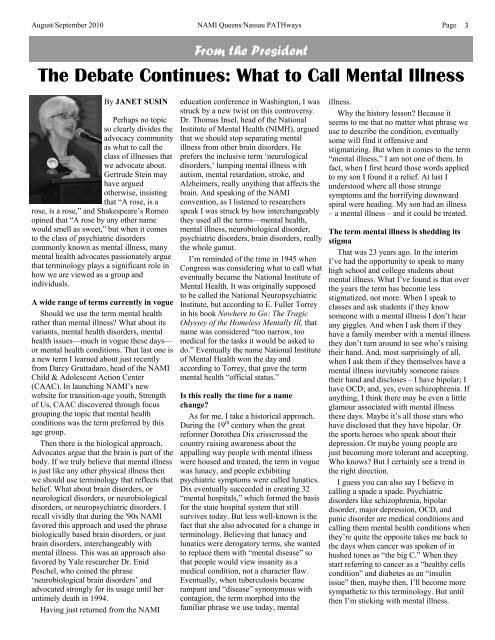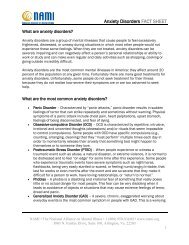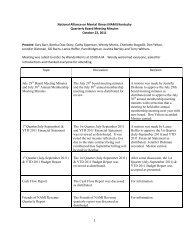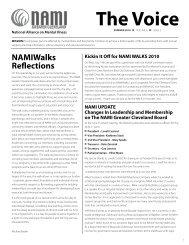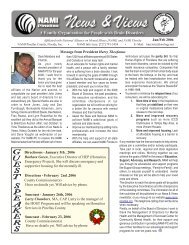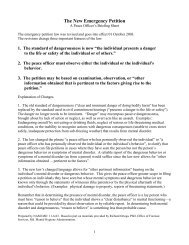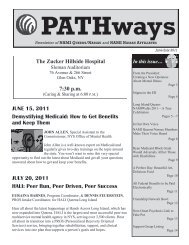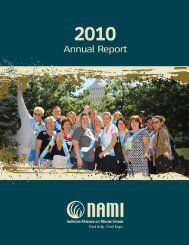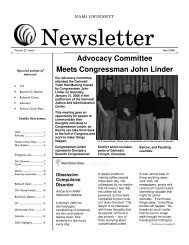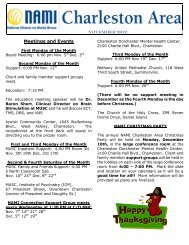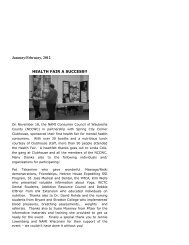PATHways Newsletter.pub - NAMI
PATHways Newsletter.pub - NAMI
PATHways Newsletter.pub - NAMI
Create successful ePaper yourself
Turn your PDF publications into a flip-book with our unique Google optimized e-Paper software.
August/September 2010 <strong>NAMI</strong> Queens/Nassau <strong>PATHways</strong> Page<br />
By JANET SUSIN<br />
Perhaps no topic<br />
so clearly divides the<br />
advocacy community<br />
as what to call the<br />
class of illnesses that<br />
we advocate about.<br />
Gertrude Stein may<br />
have argued<br />
otherwise, insisting<br />
that “A rose, is a<br />
rose, is a rose,” and Shakespeare’s Romeo<br />
opined that “A rose by any other name<br />
would smell as sweet,” but when it comes<br />
to the class of psychiatric disorders<br />
commonly known as mental illness, many<br />
mental health advocates passionately argue<br />
that terminology plays a significant role in<br />
how we are viewed as a group and<br />
individuals.<br />
A wide range of terms currently in vogue<br />
Should we use the term mental health<br />
rather than mental illness? What about its<br />
variants, mental health disorders, mental<br />
health issues—much in vogue these days—<br />
or mental health conditions. That last one is<br />
a new term I learned about just recently<br />
from Darcy Gruttadaro, head of the <strong>NAMI</strong><br />
Child & Adolescent Action Center<br />
(CAAC). In launching <strong>NAMI</strong>’s new<br />
website for transition-age youth, Strength<br />
of Us, CAAC discovered through focus<br />
grouping the topic that mental health<br />
conditions was the term preferred by this<br />
age group.<br />
Then there is the biological approach.<br />
Advocates argue that the brain is part of the<br />
body. If we truly believe that mental illness<br />
is just like any other physical illness then<br />
we should use terminology that reflects that<br />
belief. What about brain disorders, or<br />
neurological disorders, or neurobiological<br />
disorders, or neuropsychiatric disorders. I<br />
recall vividly that during the '90s <strong>NAMI</strong><br />
favored this approach and used the phrase<br />
biologically based brain disorders, or just<br />
brain disorders, interchangeably with<br />
mental illness. This was an approach also<br />
favored by Yale researcher Dr. Enid<br />
Peschel, who coined the phrase<br />
‘neurobiological brain disorders’ and<br />
advocated strongly for its usage until her<br />
untimely death in 1994.<br />
Having just returned from the <strong>NAMI</strong><br />
From the President<br />
The Debate Continues: What to Call Mental Illness<br />
education conference in Washington, I was<br />
struck by a new twist on this controversy.<br />
Dr. Thomas Insel, head of the National<br />
Institute of Mental Health (NIMH), argued<br />
that we should stop separating mental<br />
illness from other brain disorders. He<br />
prefers the inclusive term ‘neurological<br />
disorders,’ lumping mental illness with<br />
autism, mental retardation, stroke, and<br />
Alzheimers, really anything that affects the<br />
brain. And speaking of the <strong>NAMI</strong><br />
convention, as I listened to researchers<br />
speak I was struck by how interchangeably<br />
they used all the terms—mental health,<br />
mental illness, neurobiological disorder,<br />
psychiatric disorders, brain disorders, really<br />
the whole gamut.<br />
I’m reminded of the time in 1945 when<br />
Congress was considering what to call what<br />
eventually became the National Institute of<br />
Mental Health. It was originally supposed<br />
to be called the National Neuropsychiatric<br />
Institute, but according to E. Fuller Torrey<br />
in his book Nowhere to Go: The Tragic<br />
Odyssey of the Homeless Mentally Ill, that<br />
name was considered “too narrow, too<br />
medical for the tasks it would be asked to<br />
do.” Eventually the name National Institute<br />
of Mental Health won the day and<br />
according to Torrey, that gave the term<br />
mental health “official status.”<br />
Is this really the time for a name<br />
change?<br />
As for me, I take a historical approach.<br />
During the 19 th century when the great<br />
reformer Dorothea Dix crisscrossed the<br />
country raising awareness about the<br />
appalling way people with mental illness<br />
were housed and treated, the term in vogue<br />
was lunacy, and people exhibiting<br />
psychiatric symptoms were called lunatics.<br />
Dix eventually succeeded in creating 32<br />
“mental hospitals,” which formed the basis<br />
for the state hospital system that still<br />
survives today. But less well-known is the<br />
fact that she also advocated for a change in<br />
terminology. Believing that lunacy and<br />
lunatics were derogatory terms, she wanted<br />
to replace them with “mental disease” so<br />
that people would view insanity as a<br />
medical condition, not a character flaw.<br />
Eventually, when tuberculosis became<br />
rampant and “disease” synonymous with<br />
contagion, the term morphed into the<br />
familiar phrase we use today, mental<br />
illness.<br />
Why the history lesson? Because it<br />
seems to me that no matter what phrase we<br />
use to describe the condition, eventually<br />
some will find it offensive and<br />
stigmatizing. But when it comes to the term<br />
“mental illness,” I am not one of them. In<br />
fact, when I first heard those words applied<br />
to my son I found it a relief. At last I<br />
understood where all those strange<br />
symptoms and the horrifying downward<br />
spiral were heading. My son had an illness<br />
– a mental illness – and it could be treated.<br />
The term mental illness is shedding its<br />
stigma<br />
That was 23 years ago. In the interim<br />
I’ve had the opportunity to speak to many<br />
high school and college students about<br />
mental illness. What I’ve found is that over<br />
the years the term has become less<br />
stigmatized, not more. When I speak to<br />
classes and ask students if they know<br />
someone with a mental illness I don’t hear<br />
any giggles. And when I ask them if they<br />
have a family member with a mental illness<br />
they don’t turn around to see who’s raising<br />
their hand. And, most surprisingly of all,<br />
when I ask them if they themselves have a<br />
mental illness inevitably someone raises<br />
their hand and discloses – I have bipolar; I<br />
have OCD; and, yes, even schizophrenia. If<br />
anything, I think there may be even a little<br />
glamour associated with mental illness<br />
these days. Maybe it’s all those stars who<br />
have disclosed that they have bipolar. Or<br />
the sports heroes who speak about their<br />
depression. Or maybe young people are<br />
just becoming more tolerant and accepting.<br />
Who knows? But I certainly see a trend in<br />
the right direction.<br />
I guess you can also say I believe in<br />
calling a spade a spade. Psychiatric<br />
disorders like schizophrenia, bipolar<br />
disorder, major depression, OCD, and<br />
panic disorder are medical conditions and<br />
calling them mental health conditions when<br />
they’re quite the opposite takes me back to<br />
the days when cancer was spoken of in<br />
hushed tones as “the big C.” When they<br />
start referring to cancer as a “healthy cells<br />
condition” and diabetes as an “insulin<br />
issue” then, maybe then, I’ll become more<br />
sympathetic to this terminology. But until<br />
then I’m sticking with mental illness.<br />
3


